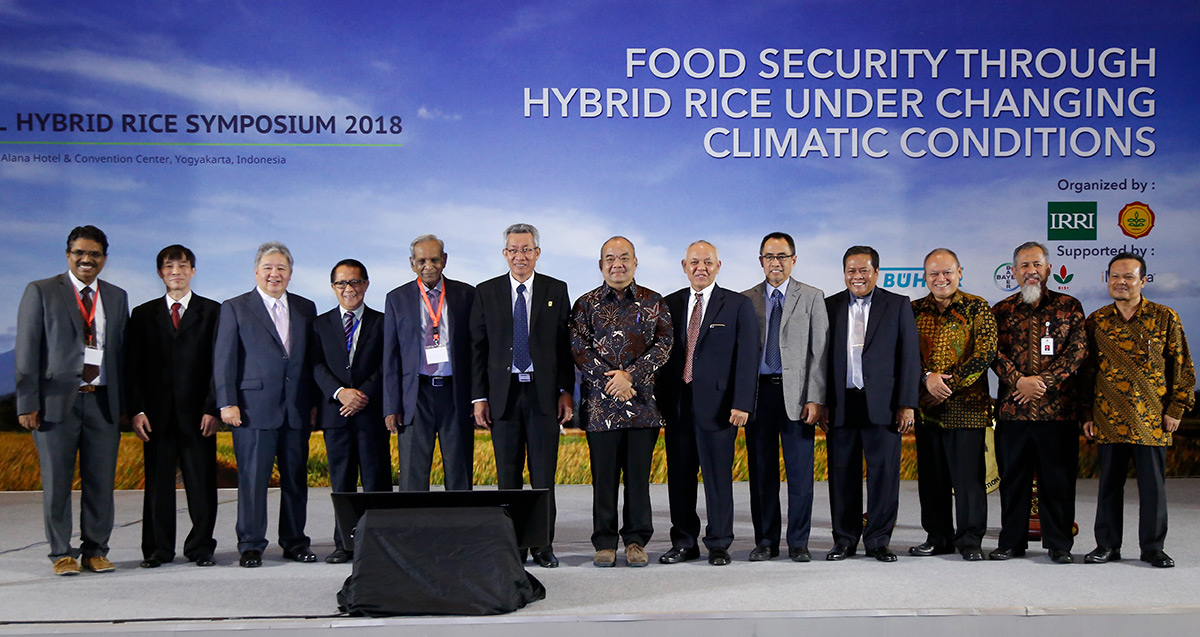Symposium tackles Indonesia hybrid rice opportunities

Yogyakarta, Indonesia – The International Rice Research Institute (IRRI) and the Indonesian Agency for Agricultural Research and Development (IAARD), Department of Agriculture brought together key stakeholders in a 3-day conference to tackle solutions toward addressing hybrid rice adoption challenges in Southeast Asia amid climate change threats.
Grounded on the theme Food Security through Hybrid Rice under Changing Climatic Conditions, the 7th International Hybrid Rice Symposium (IHRS 2018) featured discussion among leading hybrid rice researchers, representatives from public and private organizations, and industry experts from all over the world on key topics such as Hybrid Rice Genetics and Breeding, Seed Production, New Technology Applications, Crop & Resource Management, Hybrid Rice Economics, and National Policies and Public-Private Engagement on Hybrid Rice.
“The decision to hold IHRS 2018 here was deliberate. Indonesia’s well-institutionalized seed production system, infrastructure, availability of a good number of scientists, and a core group of hybrid rice breeders, make this an ideal time to ramp up hybrid rice research and development efforts,” said Dr. Bruce Tolentino, IRRI’s Deputy Director-General.
When grown under ideal conditions and with sound application, hybrid rice can generate up to 20% higher yields. With unfavorable environmental conditions such as shortage of land and water, drought, salinity, and floods affecting rice productivity, hybrid rice is seen as an emerging rice production system fit for tropical rice-growing countries such as Indonesia, despite early challenges.
“There are still setbacks such as pest-resistance, seed costs, and grain and cooking quality, among other issues. The only way we can make this technology adoptable in regions such as Indonesia is if we find solutions to these challenges that present shared benefits,” said Dr. Jauhar Ali, IHRS2018 Technical Organizing Committee Chair and Hybrid Rice Development Consortium (HRDC) Coordinator.
Since 2008, IRRI through the HRDC has been promoting hybrid rice research and providing access to new germplasm with the goal of filling in yield gaps that have been compounded by climate change, and have made rice-consuming populations increasingly vulnerable.
“By 2030, the world must produce 135 million tons of rice, which is 30% more than what we produced in 2010. With 15% to 20% more yield than inbred rice, hybrid rice plays a central role in feeding a growing population,” Tolentino said adding that public-private sector support is crucial to making hybrid rice adoption in Indonesia a success.
Organized every four years by IRRI, IHRS serves as a platform for key stakeholders to discuss critical research and implementation challenges and opportunities for hybrid rice in the context of its host country. IRRI sees hybrid rice technology as yet another viable solution to help accelerate the delivery of Indonesia’s rice self-sufficiency targets.
“For over 40 years, IRRI and Indonesia have nurtured a partnership that has resulted in increased rice productivity, improved livelihoods for Indonesian rice farmers and increased capacity through a new generation of IRRI-trained scientists. We look forward to growing this partnership further and expanding the benefits of our shared initiatives on this front,” Tolentino said.
For its part, IAARD took the symposium as an opportunity to educate Indonesia’s public and private players on the technology’s investment prospect given its government’s vision for increased domestic rice production, and possible exportation, to regain and even promote rice self-sufficiency, not just in Indonesia but for other countries as well.
“There’s an opportunity for Indonesia’s public-private sector to partner with research institutions to arrive at solutions amenable for all parties. These opportunities were greatly embedded in this symposium and we urge more participation from relevant stakeholders as we turn these into actionable targets,” said IAARD Director General Dr. Ir. Muhammad Syakir, MS.
The International Hybrid Rice Symposium 2018 was held last 27-28 February to 1 March 2018 in the Alana Hotel & Convention Center, Yogyakarta, Indonesia and featured an experiential field tour to Seyegan, Sleman District, and Margoluwih Village.
For more information on the hybrid rice technology, visit hybrid-rice.org.
About the International Rice Research Institute (IRRI)
The International Rice Research Institute (IRRI) is the world’s premier research organization dedicated to reducing poverty and hunger through rice science; improving the health and welfare of rice farmers and consumers; and protecting the rice-growing environment for future generations.
IRRI is an independent, nonprofit, research and educational institute, founded in 1960 by the Ford and Rockefeller foundations with support from the Philippine government. The institute, headquartered in Los Baños, Philippines, has offices in 17 rice-growing countries in Asia and Africa, and over 1,000 staff.
Working with in-country partners, IRRI develops advanced rice varieties that yield more grain and better withstand pests and disease as well as flooding, drought, and other harmful effects of climate change.
About the Hybrid Rice Development Consortium (HRDC)
Established by IRRI in 2008, the Hybrid Rice Development Consortium (HRDC) promotes innovation and access to new germplasm and information on hybrid rice technology. It is a membership-based organization that collaborates in the research and production of hybrid rice varieties.
About the Indonesian Agency for Agricultural Research and Development (IAARD)
Founded in 1974, IAARD is a top-level unit within the Ministry of Agriculture. The agency's functions are performed by eleven research and centers with main function to manage research and development on food crops, horticulture, estate crops, livestock, veterinary, soil and agro-climate, agro-socio economics, machinery development, post-harvest, biotechnology and agricultural technology assessment.